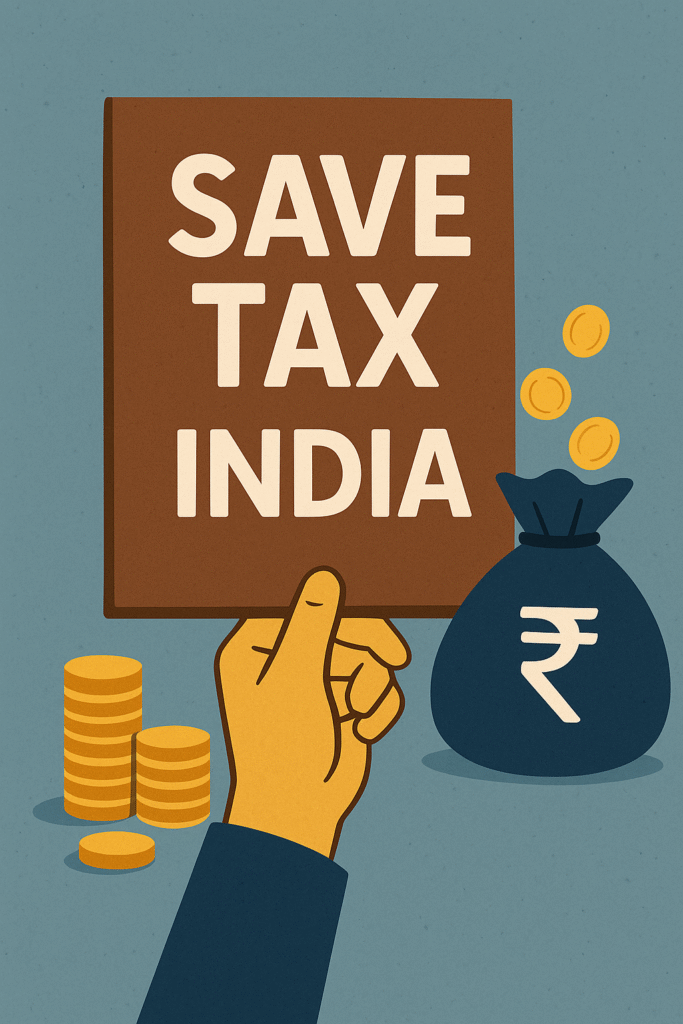In financial year 2024–25, if you are a salaried person, freelancer, content creator, or small business owner, the Indian Income Tax Act offers several smart ways to reduce your tax.

🔍 New vs. Old Tax Regime – Which One to Choose in FY 2024–25?
In India there is two tax regimes:
✅ Old Regime (with deductions)
- Allows deductions under:
- Section 80C (PPF, ELSS, LIC, etc.)
- 80D (Health Insurance)
- 24(b) (Home loan interest)
- HRA, LTA, 80E, 80G, and more
✅ New Regime (without deductions)
- Normal slab rates
- No need to claim deductions
- Standard deduction of ₹75,000 included
- No tax up to ₹7 lakh income due to rebate u/s 87A
Suggestion: If you can claim deductions more than ₹2.5 lakh, the old regime may save more tax. Otherwise, the new regime is easier and beneficial for lower incomes.
💡 Best 7 Legal Ways to Save Tax in FY 2024–25
1️⃣ Invest in Section 80C – Save up to ₹1.5 Lakh
Under the old tax regime, you can claim up to ₹1.5 lakh by investing in:
| Investment | Lock-in | Returns | Tax Benefit |
|---|---|---|---|
| PPF | 15 yrs | 7%+ | Tax-free |
| ELSS | 3 yrs | 12–15% (avg) | EEE |
| Tax-saving FD | 5 yrs | 6–7% | Interest taxable |
| Life Insurance | 5+ yrs | Depends | Premium deductible |
| EPF / VPF | Until retirement | 8.1% | EEE |
2️⃣ National Pension System (NPS) – Extra ₹50,000 under 80CCD(1B)
Apart from 80C, you can claim an additional ₹50,000 deduction by investing in NPS.
- Helps save tax
- Builds retirement corpus
- Returns ~8–10%
- Partial withdrawals allowed after 3 years
3️⃣ Health Insurance – Section 80D
| Who | Max Deduction |
|---|---|
| Self + Family | ₹25,000 |
| Senior Citizen Parents | ₹50,000 |
You can claim up to ₹75,000 total if you pay for both your family and senior citizen parents.
Also includes:
- ₹5,000 for preventive health check-ups
4️⃣ Home Loan Deductions
If you have a home loan:
- Claim up to ₹2 lakh for interest paid under Section 24(b)
- Claim up to ₹1.5 lakh for principal under Section 80C
🚨 Note: Availed under only old regime
5️⃣ Education Loan – Section 80E
- Claim 100% interest paid on education loan
- No limit on amount
- Maximum claim period = 8 years
6️⃣ Donations – Section 80G
Donate to:
- PM CARES Fund
- Registered NGOs
- Educational and religious institutions
Up to 100% or 50% deduction depending on type of donation (keep 80G certificate).
7️⃣ Savings Account Interest – Section 80TTA/TTB
- Up to ₹10,000 (for regular taxpayers)
- Up to ₹50,000 (for senior citizens)
🧑💻 Special Tax Tips for Freelancers and Bloggers
If you’re a freelancer, content creator, or blogger, follow these tips:
👉 Use Section 44ADA:
- Show only 50% of income as taxable
- No books or audit needed if gross receipts should be less than or equivalent to INR 50 lakh. If 95% transaction receipts through recognized banking channels then this limit increased to 75 lakhs.
- File ITR-4 (Presumptive Taxation)
👉 Claim Business Expenses:
You can deduct expenses like:
- Laptop, phone, camera, lighting
- Website hosting, domain
- Internet, software, editing tools
- Rent (if working from home)
- Travel and food (if business-related)
📊 Old vs New Tax Regime – Comparison Table (FY 2024–25)
| Income Level | Old Regime (with deductions) | New Regime (no deductions) |
|---|---|---|
| ₹5 lakh | ₹0 (after rebate) | ₹0 |
| ₹8 lakh | ~₹26,000 (after 80C/80D) | ₹31,200 |
| ₹10 lakh | ~₹54,600 (after full deductions) | ₹54,600 |
| ₹15 lakh | ~₹1.5 lakh | ₹1.5 lakh |
🧮 Use the Official Tax Calculator to compare your own case.
📅 Important Deadlines
- Financial Year: 1 April 2024 – 31 March 2025
- ITR filing deadline (without audit): extended to 15th Sept, 2025.
- Link PAN-Aadhaar: Check before filing
- Advance Tax Due Dates: 15 June, 15 Sept, 15 Dec, 15 March
Frequently Asked Questions (FAQs)?
Q1. Can I switch between old and new regime every year?
✅ Yes, salaried individuals can switch every year while filing ITR.
Q2. How to claim deductions under 80C or 80D?
Declare them in your ITR and keep proof (receipts, policy number and details).
Q3. What’s better: Old or New tax regime in FY 2024–25?
If you invest in 80C, 80D, home loan etc., old regime is better. Otherwise, new regime is simpler.
Q4. Do freelancers and bloggers have to pay tax?
✅ Yes, they must file ITR and pay tax like any other profession.
Q5. Is NPS tax-free on withdrawal?
No. Only 60% is tax-free on retirement. Remaining 40% is used to buy an annuity (pension), which is taxable.
Start early, track your investments, claim eligible deductions, and file your ITR correctly.